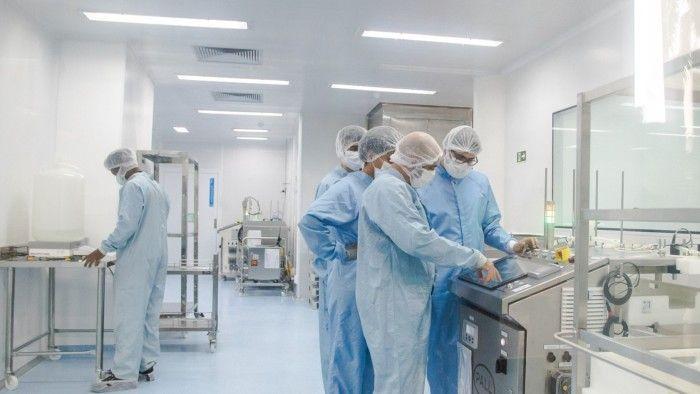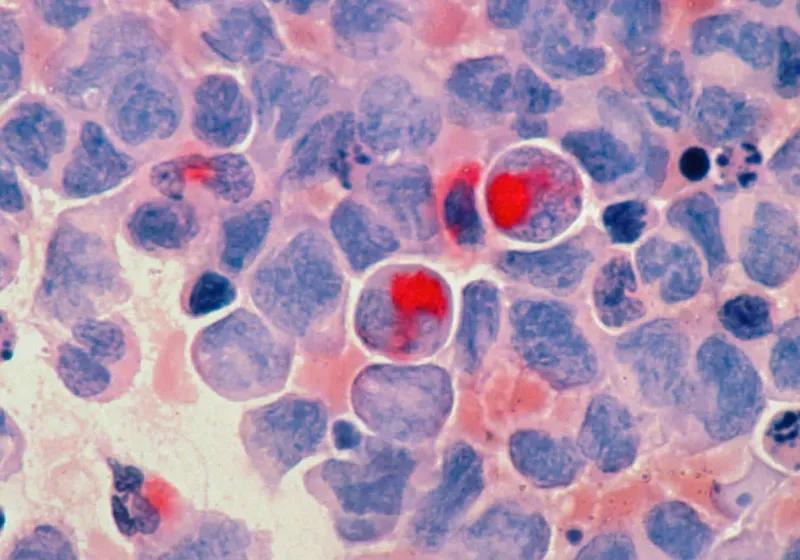AstraZeneca Partners with Immunai for AI-Driven Cancer Drug Trials
3 Sources
3 Sources
[1]
AstraZeneca in AI collaboration with Immunai to inform cancer drug trials
Sept 26 (Reuters) - AstraZeneca will pay $18 million to biotechnology firm Immunai Inc to use the New York-based firm's AI model of the immune system to make certain cancer drug trials more efficient, the latter said on Thursday. This is the latest in a string of tie-ups by Anglo-Swedish drugmaker AstraZeneca to use artificial intelligence for drug discovery and development, including a $247 million deal with U.S.-based Absci (ABSI.O), opens new tab late last year to design an antibody to fight cancer. Advertisement · Scroll to continue Founded in 2018, Immunai uses single-cell genomics, a technique to understand the genetic makeup of single cells, and machine learning to discover and improve the development of novel therapeutics by decoding the immune system. The collaboration will focus on clinical decision-making, including dose selection and biomarker identification, by using Immunai's platform, and AstraZeneca has the option to expand the length and scope of the collaboration afterward, the U.S.-based company said. Advertisement · Scroll to continue The initial phase will give AstraZeneca access to Immunai's AI platform and help gain potential insights into mechanisms of action of immunotherapies, said AstraZeneca chief data scientist of oncology R&D Iker Huerga. Reporting by Yadarisa Shabong in Bengaluru; Editing by Vijay Kishore Our Standards: The Thomson Reuters Trust Principles., opens new tab
[2]
AstraZeneca in AI Collaboration With Immunai to Inform Cancer Drug Trials
(Reuters) - AstraZeneca will pay $18 million to biotechnology firm Immunai Inc to use the New York-based firm's AI model of the immune system to make certain cancer drug trials more efficient, the latter said on Thursday. This is the latest in a string of tie-ups by Anglo-Swedish drugmaker AstraZeneca to use artificial intelligence for drug discovery and development, including a $247 million deal with U.S.-based Absci late last year to design an antibody to fight cancer. Founded in 2018, Immunai uses single-cell genomics, a technique to understand the genetic makeup of single cells, and machine learning to discover and improve the development of novel therapeutics by decoding the immune system. The collaboration will focus on clinical decision-making, including dose selection and biomarker identification, by using Immunai's platform, and AstraZeneca has the option to expand the length and scope of the collaboration afterward, the U.S.-based company said. The initial phase will give AstraZeneca access to Immunai's AI platform and help gain potential insights into mechanisms of action of immunotherapies, said AstraZeneca chief data scientist of oncology R&D Iker Huerga. (Reporting by Yadarisa Shabong in Bengaluru; Editing by Vijay Kishore)
[3]
Immunai to collaborate with AstraZeneca on oncology clinical trials
Under the terms of the agreement, AstraZeneca will leverage Immunai's platform and machine learning capabilities to inform certain oncology clinical trials. Immunai Inc., a New York-based artificial intelligence and biotech company specializing in mapping the human immune system, has announced a multi-year collaboration with pharmaceutical giant AstraZeneca aimed at optimizing oncology clinical trials. The partnership builds upon Immunai's proprietary immune cell atlas, AMICA™, and its AI model of the immune system, the Immunodynamics Engine (IDE)™. Under the terms of the agreement, AstraZeneca will leverage Immunai's platform and machine learning capabilities to inform certain oncology clinical trials. The initial phase of the collaboration will focus on clinical decision-making processes, such as dose selection, understanding mechanisms of action, distinguishing between patient responders and non-responders, and identifying biomarkers. Immunai is set to receive $18 million for this initial phase, with AstraZeneca retaining an option to expand the length and scope of the collaboration. "This collaboration is a natural progression of our successful work in advancing drug development in the fields of oncology and immunology," said Noam Solomon, Ph.D., CEO of Immunai. "Bringing a drug to market is incredibly challenging, time-consuming, and expensive. Through this collaboration with AstraZeneca, we're excited to leverage our AI-based engine, the IDE™, to help make this process more efficient in bringing potential new therapies to patients." Iker Huerga, Chief Data Scientist, Oncology R&D at AstraZeneca, emphasized the transformative impact of AI in clinical development, stating, "Artificial intelligence is transforming cancer drug discovery and clinical development. We are very pleased to collaborate with Immunai to leverage their innovative platform to enhance our data-driven R&D strategy and glean potential new insights into mechanisms of action of immunotherapies." Partnership began in 2022 The collaboration marks a continuation of the companies' partnership, which began in 2022 and has already provided valuable insights for multiple clinical programs. AstraZeneca's decision to deepen its relationship with Immunai highlights the increasing role of AI in enhancing the success rates of clinical trials, ultimately maximizing research and development productivity. Immunai, known for its groundbreaking use of single-cell genomics and machine learning, has quickly become a key player in the biotech space. With a team of 170 employees, including 85 PhDs or MDs, the company has established over 30 partnerships with leading pharmaceutical companies and academic institutions worldwide. To date, Immunai has raised nearly $270 million in funding and continues to push the boundaries of what AI can achieve in drug discovery and development. Sign up for the Health & Wellness newsletter >>
Share
Share
Copy Link
AstraZeneca collaborates with Immunai to leverage artificial intelligence in cancer drug trials. The partnership aims to enhance patient selection and optimize treatment strategies using advanced AI technology.

AstraZeneca and Immunai Join Forces in AI-Driven Cancer Research
In a groundbreaking move, pharmaceutical giant AstraZeneca has announced a collaboration with Immunai, a leader in artificial intelligence for immunology, to revolutionize cancer drug trials
1
. This partnership marks a significant step forward in the application of AI technology to oncology research and treatment development.Enhancing Patient Selection with AI
The primary focus of this collaboration is to harness Immunai's advanced AI capabilities to improve patient selection for clinical trials. By analyzing vast amounts of biological data, the AI system aims to identify patients who are most likely to respond positively to specific cancer treatments
2
. This targeted approach has the potential to significantly increase the success rate of drug trials and accelerate the development of effective cancer therapies.Optimizing Treatment Strategies
Beyond patient selection, the partnership seeks to optimize treatment strategies for cancer patients. The AI technology will be employed to analyze complex immunological data, helping researchers understand how different patients' immune systems respond to various treatments
3
. This insight could lead to more personalized and effective treatment plans, potentially improving outcomes for cancer patients worldwide.The Role of Machine Learning in Drug Development
AstraZeneca's collaboration with Immunai is part of a broader trend in the pharmaceutical industry towards leveraging machine learning and AI in drug development. These technologies have the potential to process and analyze vast amounts of data much faster than traditional methods, potentially leading to quicker discoveries and more efficient drug trials
1
.Related Stories
Impact on Cancer Research and Treatment
This partnership has the potential to significantly impact the field of cancer research and treatment. By using AI to better understand patient responses and optimize trial designs, AstraZeneca and Immunai aim to accelerate the development of new cancer therapies. This could lead to more effective treatments reaching patients faster, potentially saving countless lives
2
.Future Prospects and Challenges
While the collaboration between AstraZeneca and Immunai holds great promise, it also faces challenges. Ensuring the ethical use of patient data, validating AI-driven insights, and integrating these new technologies into existing clinical trial frameworks will be crucial for the success of this initiative
3
. As this partnership progresses, it will be closely watched by the medical community and could set new standards for AI application in pharmaceutical research.References
Summarized by
Navi
[3]
Related Stories
AstraZeneca acquires Modella AI to accelerate oncology drug development with foundation models
14 Jan 2026•Business and Economy

AstraZeneca's $555 Million AI-Powered Gene-Editing Deal with Algen Biotechnologies
06 Oct 2025•Technology

AstraZeneca and CSPC Pharmaceuticals Forge $5.2 Billion AI-Driven Partnership for Chronic Disease Research
13 Jun 2025•Business and Economy

Recent Highlights
1
OpenAI secures $110 billion funding round from Amazon, Nvidia, and SoftBank at $730B valuation
Business and Economy

2
Samsung unveils Galaxy S26 lineup with Privacy Display tech and expanded AI capabilities
Technology

3
Anthropic faces Pentagon ultimatum over AI use in mass surveillance and autonomous weapons
Policy and Regulation





